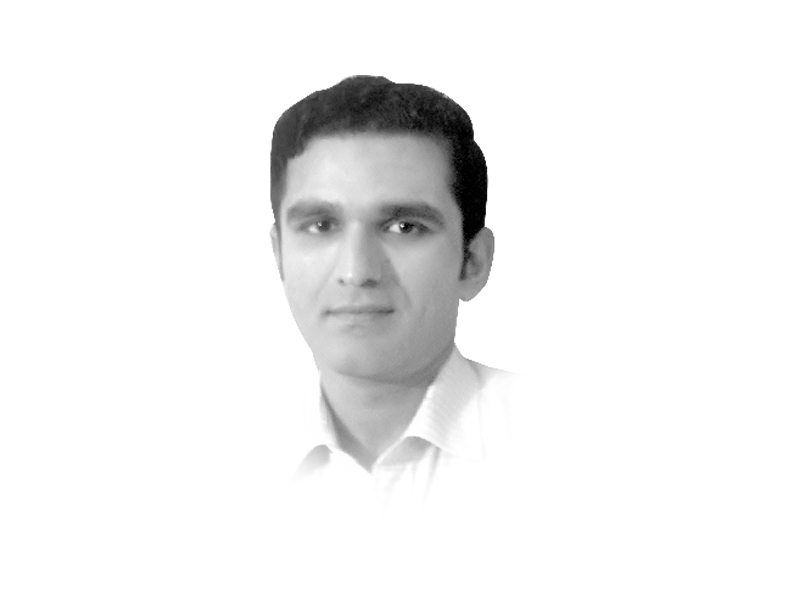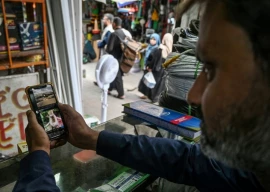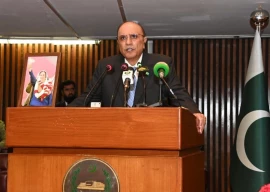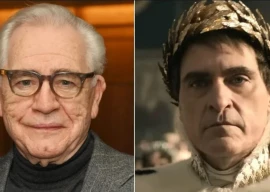
A couple of weeks ago when I thought of today, I planned to write a great piece on the Jaipur Literature Festival — the importance of such events, and its role in fostering India-Pakistan dialogue through interaction. I had planned to take three students (Tarhub, Ali and Sarmad) and one other faculty member (Dr Ejaz Hussain) — all first-time visitors to India — to the festival so that they could enjoy it — and India — and come back with fond memories and initiate more people to people contact. The students were keener because they were going to be the key people coordinating volunteers at the upcoming Lahore Literary Festival, which I have co-founded, and use the best practices from Jaipur. However, the reality of the India visit has been far from the rosy picture I had wanted to paint.
While all of us got our visas just in the nick of time, only I was exempted from police reporting. Not ever having had a reporting visa, I assumed that it would just be a simple visit to a registration office, and so not a big hassle. So we crossed over on foot from Wagah on January 24, and got to Attari. At Attari everyone was very cordial and we told the immigration and intelligence officials that we were planning to go from Amritsar to Jaipur on the overnight train and would stay there till January 29. Then we would go to Delhi and stay there till about January 31-February 1, 2013. So, all was reported and set. But when we got to Amritsar we heard that the Jaipur train had been cancelled, and so we had to take the afternoon train to Delhi and then go onwards to Jaipur. Undeterred by this change, we took a train to Delhi only to find that it was simply impossible to get a ticket to Jaipur that day. So we had no choice but to hire a rather expensive taxi, and got to Jaipur, sleepless and freezing, in the early hours of January 25. This is where the trip took a bad turn.
As required, I took everyone to the Foreigners Registration Office (FRO) in Jaipur for the formalities. However, they refused to register us and said that since Delhi had been mentioned first in the visa (with Jaipur afterwards) we had to go to Delhi first to register. We explained that we were never told of this requirement either at the Indian High Commission or the border, or else we would have obviously followed the law. Despite all this, the staff there, who were rather rude and patently anti-Pakistani, said that there was no way to skip another trip to Delhi. Interestingly, when I asked the in charge of the Pakistan cell there what the ‘rules’ were, (since he kept mentioning that we have broken a ‘rule’), he flatly refused to tell us the rules. Obviously, the fact that one needs to know the rules to follow them was lost on him.
As a result, we made another gruelling trip to Delhi. Our treatment at the Delhi FRO was in sharp contrast to the Jaipur experience. Not only were the staff really helpful and did all the formalities quickly, the Deputy Commissioner of Police apologised for the bad behaviour of the Jaipur staff and treated us to tea. He also asked me to write a letter of complaint about the Jaipur staff which we did. Since that morning was Republic Day in India, we could not get a bus or a train to Jaipur easily and only got an afternoon bus to Jaipur which got us there at around 9pm. The next morning, of course, we made the trip to the FRO in Jaipur, got registered, and then visited the local police station to again register.
So after entering India at 9.30am on January 24, we could only get to the Jaipur Literature Festival, our main purpose of visit, at 3pm on January 27 — a total of about 78 hours of travelling and registration hassle!
Issues like these are the real thorn between the two countries. I have met several high level officials in India and they have never been anything but kind and helpful. But this was my first experience with lower-level officials in India, and it was bad. As a matter of fact, all of my students said that they would not want to visit India again after this punishing visit. These youth are the future of both the countries, and if they develop such an image of the other side then peace really has no chance in the long term.
At the festival, several people mentioned that India and Pakistan have a shared culture and history, and therefore natural ties. However, culture and history is not lived through in our imagination, it needs interaction and dialogue. If you treat people like this (it is possible that it is the same case in Pakistan) and they never visit again, then eventually these ties will fade away. Already two generations have passed since Partition, and I believe that if interaction is prevented with actions like these the gulf created would lead to Pakistan and India sharing very little except geography within our lifetimes. We have great proponents of peace and cooperation on both sides, and Mr Mani Shankar Aiyar (former Union minister and Congress politician) helped us greatly in this visit, but if such visits, which should be routine, are treated in this manner no linkages between the people of the two countries — the real constituents here — will remain.
If Europe can become united after centuries of warfare and two world wars, then it is not impossible for Pakistan and India to become close friends, while retaining their sovereignty. However, while conversations are important at the high official level, it is the attitude of the lower officials and the interaction between the people of both countries which really counts. Let us give peace and goodwill a chance but let us also begin with the people.
Published in The Express Tribune, January 29th, 2013.
COMMENTS (36)
Comments are moderated and generally will be posted if they are on-topic and not abusive.
For more information, please see our Comments FAQ



















































Why did the writer visit India in the first place? Being a history professor, didn't he know already that India is our eternal enemy? What else would one expect from the Indians
@gp65.
'I notice that you forgot to mention Jinnah. Which side of the equation do you place him?'
Quite honestly, I am not sure if I did. It is more probable that his name didn't cross my mind as I was looking for people who will be found at the opposing extreme end of the poll, metaphorically speaking. And in that sense I will put him somewhere in the middle, where most people eminent and obscure alike belong.
if you had not followed the rules the response you got was justified.
Same thing is happening on other side. My own father & brother suffered during 2 separate visits.
I disagree with author that relationships between future generations will weaken. Given Pakistan's state of affairs, India can't let its guard down. Despite these negatives, future generations of India and Pakistan will come closer if they adopt the right attitudes, an open mind and see independent knowledge not what narrow-minded, ideologically boxed-in elders pass down to their progeny.
peoples of india and pakistan loving each other, but unfortunately some hardmine persons not wanted much closeness.
Let me try my comment again: the Jaipur immigration official enforced the rules as expected of him. So, why blame him and why keep apologizing on his behalf. Indians should be glad that he enforced the law as prescribed.
There could have been a local supervisor with discretionary power but that is a lesson learnt here. I am sure the situation arose because the students had restricted visa unlike the author and as always there are two sides to the story.
The author has crossed his privilege when he demanded to know the rules from him. It is not required and he has no right to ask that question. As a visitor he is expected to obey the laws of the land.
Now, the focus should be to eliminate such barriers.
@Deb; India: "People from all over the world look at Gandhi, Mandela, Lincoln with awe. How many remembers the likes of Nathuram Godse, Surhawardy or their ilks with fondness? "
I notice that you forgot to mention Jinnah. Which side of the equation do you place him?
@Sinclair: the European values are based on 'universal Values' values rather than Christian values even if the Christian traditions have played a very important role.
You keep harping on the same shared culture by citing the European example, while conveniently forgetting or ignorant that all of them share the same foundational structures. and that is:
a. Roman Law b. Greek philosophy c. Judeo - Christian principles
The one country that is a misfit over there, and who is trying to "FIT" in is Turkey. And, why is it a misfit ? In one word "Islam". Remove Islam from Turkey, and it is will be a member of EU the very next day.
What does India and Pakistan have in common like the ones listed above ?
@Author Sincere apology from a concerned India. Please visit again.
One bad experience at Jaipur police department should not become sore point for the students who were visiting India for first time. Though such rude behaviour of people in authority be that police, Revenue departments, local municipalities, Babus etc s not uncommon here in India. If you happen to follow India media, there are tons of stories of high handedness of people in authority shown to Aam admi. My experience while in US or otherwise also throws incidents which can lead to feeling discomfort, anger and almost being discriminated. So, we all have quite a distance to travel before world becomes one. There will be always fringe elements everywhere who would create ruckus , hatred on issues like religion, colour, creed, race etc. let not your students miss the bigger picture .. Bigger picture of harmony, brotherhood, tolerance etc.
Thank You for sharing this story. It is unfortunate that both you and your students have to go through this bureaucratic process(or anti-pakistani in some instances). I think we should do away with registering with local police station for short term visits. Until we have this rule the Indian government should make sure policemen working in these FRO office are trained to be visitor friendly.
Welcome to India, at least you got tea, if you were Indian you wouldn't even get the tea -
“India and Pakistan have a shared culture and history, and therefore natural ties. However, culture and history is not lived through in our imagination, it needs interaction and dialogue. If you treat people like this (it is possible that it is the same case in Pakistan) and they never visit again, then eventually these ties will fade away. Already two generations have passed since Partition, and I believe that if interaction is prevented with actions like these the gulf created would lead to Pakistan and India sharing very little except geography within our lifetimes"
The above lines are so meanigful and magnificent. The statement fulfill as well contardict Quaid's wisdom and TNT which is the very basis of Pakistani state. Sir Ji, Please dont insult Quaid by stating that there is any thing common between Indians and Muslims of Pakistan who are but the essential extentiion of Arabia into South Asia. Peace is long way, Understanding yes, tolerance yes but accpetence of any natural relation big NO.
I am very sorry to hear about the bureaucratic hassles you and your group had to go through in India. The lower level officials in India have been drilled to strictly follow these stupid rules. I know of many stories of Indians on US passports who have been turned back at Indian airports for some silly "by the book" reasons.
Of course, things will always be more difficult for the Pakistani visitors to visit India in the foreseeable future for reasons we all know too well. Also, your visit coincided with cross-border beheading of an India soldier. I am sure the nerves were very raw from this incident, but I don't know if it has anything to do with the bad treatment you received.
I hope your students will not get too discouraged from visiting India again. It is important that people like you on both sides carry on your goodwill efforts to take the countries to a day when enduring peace and cooperation prevails. While I myself am not part of the candle-holding peace brigade, I do recognize the important of such sentiments in the longer term interests of both countries. The well-meaning intellectuals should be encouraged to continue their people to people contacts.
@Author
Please accept my sincere apology for the inconvenience you experienced while in India. I can understand the feelings of the students who were your fellow travelers, but please tell them that, "I (you) have met several high level officials in India and they have never been anything but kind and helpful." Most of the low level functionaries that you came across are either prepared to err on a scale of morality than found lax on safety measures, or like @Sinclair and @Vikas, look at every opinion from Pakistan through a religious prism. In a long chain of history they end up in the dustbin. People from all over the world look at Gandhi, Mandela, Lincoln with awe. How many remembers the likes of Nathuram Godse, Surhawardy or their ilks with fondness?
@Vikas: Dear potential Modi-voter, no doubt civilized culture is anathema to people like you.
I wonder why Indians harbor so much of anti pakistanism in their hearts. Indians divided our beloved Pakitsan into , they still occupy our lands and kill our soilders on LOC. too much for most favored nation and aman ki aasha
Very sorry to hear of the ordeal. This has also been reported in Indian papers and the authorities in Jaipur who asked you to go to Delhi, are being investigated.
We owe you an apology. Pettiness among us neighbors knows no bounds and I am sad we made young students feel so badly for this country. I do hope and pray India acts in a more civilized fashion with Pakistani guests. Wish you come here again and have a better experience.
You shouldn't have gone to that neighbouring country. Now that you did, be big enough to admit that you made a mistake.
What Kind of a Stupid article was this???? Trying to overly give importance and feeling surprised about the behavior patterns of Low-Level Asian Government officials?? An article being published in one of the leading daily newspaper should serve some purpose..This however should have been published, in a concise form under the section,"Letters to the Editor". The writer really needs to brush up his skills.
I still hope things will improve in few years. Don't be disheartened and keep doing your great work.
Best way to address these problems would be to authorize the police booths at airports and railway stations to to the registration. Ofcourse ideal would be to have no registration at all. City specific visa too is a ridiculous idea. However, I see no progress till Jihadis are active. Anyway Jihadis don't care for VISA as they can travel without documents via sea or via Nepal.
Very often harmless ordinary citizens are the ones who bear the brunt of antagonism between states. Your experience is truly unfortunate, and I really don't know whether it can be connected with this supposed antipathy and lack of professionalism in lower-level functionaries, or some personal bias that this particular gentleman had, or whether he just felt justified given the current atmosphere of mistrust - either ways, it is inexcusable. Since you have been to India several times before and this is your first (here I assume) lousy experience, I suggest that you do not draw a trend line based on this one data point. Mani Shankar Aiyar is probably better off standing for elections in Pakistan than in India, since he has no popular base here because of his poor grasp on reality and desire to endlessly compromise until Pakistan will have nothing else to ask for - I suggest that you do not draw trend lines from this data point either.
Deeply regret the unfortunate experience your team had in Jaipur . I really wish it had been a different experience .
It's always been so between the two neighbors.
I can empathize with the writer and the young students. Unfortunately Rajistan is not the most liberal part of India and I have seen most signs in only Hindi. Obviously they did not want me to read the signs and did not get my business. Having signs in English makes it tourist friendly. This reminds me of a trip from India back to the Lahore airport about 15 plus years ago. On their entry to Pakistan most Indian passengers were thoroughly interrogated and searched. I have seen old Indian Muslim women begging the custom officials and tall young Seiks crying with tears. It is sad that we live to create trouble for each other. Some things never change.
Very Sad. Accept my apologies for what they have done. Even they behave in the same way with Indians but it cannot be justified when it is done with the visitor who comes here depending on us. Sorry once again. Keep coming Back
"India and Pakistan have a shared culture and history, and therefore natural ties. However, culture and history is not lived through in our imagination, it needs interaction and dialogue. If you treat people like this (it is possible that it is the same case in Pakistan) and they never visit again, then eventually these ties will fade away. Already two generations have passed since Partition, and I believe that if interaction is prevented with actions like these the gulf created would lead to Pakistan and India sharing very little except geography within our lifetimes."
This sums up the condition in which we are living for the past 65 years. It seems that official policy (unofficial) of both the countries is to suppress the interpersonal contacts between the citizens of the both country. They have everything to gain from suppressing this interaction and everything to loose if they promote it........... understandable behavior on the part of officials!!!!
Dr. Bangash, thank your lucky stars that you know Mr. Ayar and the DSP offered you tea. Some of us ordinary souls spent 4 days just in Delhi just figuring out the requirements. Add to that the threat that you can't leave India until you figure out registration. . Having said that we need peace and the only way there can be peace if we can visit each other without much trouble
Dear Yakoob,
sorry to hear your plight. I hope we become more friendly as nations. The problem with the government staff in India is- they are very stubborn, when it comes to Pakistan. They take no chances. Any small mishap and they lose their job. With Western (read whits skinned) tourists, they go extra mile accommodating them. I guess it is same on the other side of the border.
Anyways, I feel we are still a few decades away from normal relations.
If your students don't want to visit India anymore, that's not a problem at all. There should be some reason as to why visitors from Pakistan had to face trouble and not that from other countries. More over , Europe had separate countries since the beginning and not that a new country was born on the basis of religion. I am surprised to know that people who broke India, want to visit India.
Sorry to bust your bubble, but EU is based on Christian values and traditions. What would a South Asian Union be based on? Especially when the Partition was on religion lines. It is just not going to happen. Lets just stay in our respective countries and be happy for each other.
i feel sorry for the rude behavior of the staff of FRO at Jaipur. I too do not know the rules if visit has to be carried out as per the travel plan mentioned in visa . But since a complaint has been lodged at the Delhi office (and if the Jaipur FRO has has acted against the rule ) i am sure they person concerned ( officer in charge) shall have to face the consequences. With so much tension between the two countries anti Pakistani sentiments can not be ruled out. Behavior of FRO Jaipur does not deserve to be generalized. good wishes and hope for the best .
Blame ur nation for all ur sufferings everywhere...